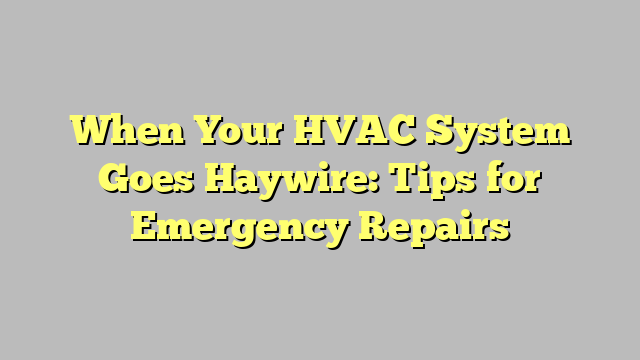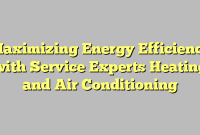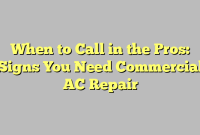HVAC systems play a crucial role in maintaining a comfortable and healthy indoor environment. They are responsible for heating, ventilation, and air conditioning, ensuring that the temperature and air quality in a building are optimal. However, like any mechanical system, HVAC systems can experience issues and breakdowns, sometimes requiring emergency repairs. In this article, we will explore the signs that indicate your HVAC system needs emergency repairs, the importance of addressing HVAC issues quickly, common HVAC emergencies and their causes, DIY fixes vs. professional repairs, how to find a reliable HVAC repair company, what to expect during an emergency HVAC repair visit, safety precautions to take when dealing with HVAC emergencies, how to prevent future HVAC emergencies, the cost of emergency HVAC repairs, understanding your HVAC system for better maintenance, and when to consider replacing your HVAC system instead of repairing it.
Signs Your HVAC System Needs Emergency Repairs
1. Strange noises or smells: If you notice unusual sounds coming from your HVAC system, such as banging, grinding, or squealing noises, it could indicate a serious problem that requires immediate attention. Similarly, if you detect strange odors like burning or musty smells, it could be a sign of electrical issues or mold growth.
2. Uneven heating or cooling: If certain areas of your home are significantly warmer or cooler than others, it could indicate a problem with your HVAC system. This could be due to issues with the ductwork or a malfunctioning thermostat. Uneven heating or cooling can lead to discomfort and reduced energy efficiency.
3. Poor air flow: If you notice weak or inconsistent air flow from your vents, it could be a sign of a clogged air filter or a problem with the blower motor. Poor air flow can result in reduced comfort and increased energy consumption.
4. High energy bills: If you notice a sudden increase in your energy bills without any changes in your usage patterns, it could indicate that your HVAC system is not operating efficiently. This could be due to a variety of issues, such as a malfunctioning compressor or leaking ductwork.
The Importance of Addressing HVAC Issues Quickly
1. The potential dangers of ignoring HVAC problems: Ignoring HVAC issues can lead to serious consequences. For example, electrical issues can pose a fire hazard, while leaking refrigerant can be harmful to your health. Additionally, HVAC problems can lead to poor indoor air quality, which can cause respiratory issues and allergies.
2. The cost savings of addressing issues early on: Addressing HVAC issues promptly can help prevent further damage and costly repairs. For example, a minor refrigerant leak can be fixed easily and inexpensively, but if left unattended, it can cause the compressor to fail, resulting in a much more expensive repair or even the need for a full system replacement.
Common HVAC Emergencies and Their Causes
1. Frozen coils: Frozen coils are a common HVAC emergency that can occur due to restricted airflow, low refrigerant levels, or a malfunctioning blower motor. When the coils freeze, the system is unable to cool the air properly, leading to reduced comfort and potential damage to the compressor.
2. Leaking refrigerant: A refrigerant leak is another common HVAC emergency that can result in reduced cooling capacity and increased energy consumption. Refrigerant leaks can occur due to corrosion, faulty connections, or physical damage to the refrigerant lines.
3. Electrical issues: Electrical issues in an HVAC system can be dangerous and require immediate attention. These issues can range from faulty wiring to blown fuses or tripped circuit breakers. Ignoring electrical problems can lead to fire hazards or damage to the system’s components.
4. Clogged air filters: Clogged air filters restrict airflow and reduce the efficiency of your HVAC system. This can lead to increased energy consumption, poor air quality, and potential damage to the system’s components. Regularly changing or cleaning air filters is essential to prevent this common HVAC emergency.
DIY Fixes vs. Professional Repairs: Which is Best?
1. The risks and benefits of DIY repairs: While some HVAC issues can be resolved with simple DIY fixes, such as changing air filters or resetting a tripped circuit breaker, more complex problems should be left to professionals. Attempting to repair complex HVAC issues without the necessary knowledge and experience can lead to further damage and safety hazards.
2. The advantages of hiring a professional HVAC repair company: Professional HVAC repair companies have the expertise, tools, and resources to diagnose and repair complex HVAC issues effectively. They can ensure that the repairs are done correctly and safely, minimizing the risk of further damage or safety hazards. Additionally, hiring professionals can save you time and effort, allowing you to focus on other priorities.
How to Find a Reliable HVAC Repair Company
1. Tips for researching and selecting a reputable company: When looking for an HVAC repair company, it is important to do thorough research and consider factors such as their experience, reputation, and customer reviews. Ask for recommendations from friends, family, or neighbors who have recently had HVAC repairs done. Look for companies that are licensed, insured, and certified by reputable organizations.
2. The importance of checking for licensing and insurance: Hiring a licensed and insured HVAC repair company is crucial for your protection. A licensed company has met the necessary requirements and regulations set by the state or local authorities. Insurance coverage protects you from liability in case of accidents or damages that may occur during the repair process.
What to Expect During an Emergency HVAC Repair Visit
1. The steps involved in diagnosing and repairing HVAC issues: When a professional HVAC technician arrives at your home for an emergency repair visit, they will first assess the situation by inspecting the system and listening to your description of the problem. They may perform tests, such as checking the refrigerant levels or measuring airflow. Once the issue is diagnosed, the technician will explain the problem and provide you with repair options. They will then proceed with the necessary repairs, ensuring that everything is done safely and efficiently.
2. The importance of clear communication with the repair technician: During an emergency HVAC repair visit, it is important to communicate clearly with the repair technician. Provide them with as much information as possible about the issue and any symptoms you have noticed. Ask questions if you don’t understand something or need clarification. Clear communication will help the technician diagnose and resolve the problem more effectively.
Safety Precautions to Take When Dealing with HVAC Emergencies
1. Tips for staying safe when dealing with HVAC emergencies: When faced with an HVAC emergency, it is important to prioritize your safety. If you notice any signs of a gas leak, such as a rotten egg smell or hissing sounds, evacuate your home immediately and call your gas company. In case of electrical issues, turn off the power to your HVAC system at the circuit breaker before attempting any repairs. If you are unsure or uncomfortable dealing with the emergency yourself, call a professional HVAC repair company for assistance.
2. The importance of turning off the system and calling for professional help: In most HVAC emergencies, it is best to turn off the system and call for professional help. Attempting to fix complex issues without proper knowledge and experience can be dangerous and may cause further damage to the system or pose safety hazards. Professional HVAC technicians have the expertise and tools to handle emergencies safely and effectively.
How to Prevent Future HVAC Emergencies
1. Tips for regular maintenance and upkeep of HVAC systems: Regular maintenance is key to preventing future HVAC emergencies. Some simple maintenance tasks you can do yourself include regularly changing or cleaning air filters, keeping outdoor units clear of debris, and ensuring that vents and registers are not blocked. Additionally, scheduling professional maintenance visits at least once a year can help identify and address potential issues before they become emergencies.
2. The importance of scheduling regular inspections and tune-ups: Regular inspections and tune-ups by professional HVAC technicians are essential for maintaining the efficiency and longevity of your system. During these visits, the technician will inspect and clean the system, check for any potential issues, and make necessary adjustments or repairs. Regular inspections and tune-ups can help prevent unexpected breakdowns and costly emergency repairs.
The Cost of Emergency HVAC Repairs: What to Expect
1. Factors that can impact the cost of emergency repairs: The cost of emergency HVAC repairs can vary depending on several factors, including the nature and severity of the issue, the type of system you have, the availability of replacement parts, and the time required to complete the repairs. Complex issues or those requiring specialized parts may be more expensive to repair.
2. The importance of getting a clear estimate before work begins: Before any work begins, it is important to get a clear estimate from the HVAC repair company. The estimate should include a breakdown of the costs, including labor, parts, and any additional fees. Getting a clear estimate upfront will help you understand the expected costs and avoid any surprises when it comes time to pay.
Understanding Your HVAC System: Tips for Better Maintenance
1. An overview of how HVAC systems work: HVAC systems consist of various components that work together to heat, cool, and ventilate indoor spaces. The main components include a furnace or heat pump for heating, an air conditioner for cooling, ductwork for distributing air throughout the building, and a thermostat for controlling temperature settings. Understanding how these components work together can help you better maintain your system.
2. Tips for better maintenance and upkeep: In addition to regular maintenance tasks like changing air filters and keeping outdoor units clean, there are other steps you can take to ensure the optimal performance of your HVAC system. These include sealing air leaks in ductwork, insulating your home to reduce energy loss, and using programmable thermostats to optimize energy usage. Additionally, it is important to be mindful of your system’s capacity and not overload it by setting extreme temperature settings.
When to Consider Replacing Your HVAC System Instead of Repairing It
1. Signs that it may be time to replace your HVAC system: While many HVAC issues can be resolved with repairs, there comes a point when it may be more cost-effective to replace the entire system. Signs that it may be time for a replacement include frequent breakdowns, a system that is more than 10-15 years old, rising energy bills despite repairs, and the need for major repairs that exceed the value of the system.
2. The benefits of upgrading to a newer, more efficient system: Upgrading to a newer, more efficient HVAC system can offer several benefits. Newer systems are designed to be more energy-efficient, resulting in lower energy bills and reduced environmental impact. They also come with advanced features and technologies that can improve comfort and indoor air quality. Additionally, newer systems often come with warranties that provide peace of mind and protection against unexpected repairs.
Emergency HVAC repairs are crucial for maintaining a comfortable and healthy indoor environment. By recognizing the signs that indicate your HVAC system needs emergency repairs and addressing issues quickly, you can prevent further damage and costly repairs. Regular maintenance and upkeep, as well as scheduling professional inspections and tune-ups, can help prevent future emergencies. When faced with an HVAC emergency, it is important to prioritize your safety and call for professional help if needed. By understanding your HVAC system and its components, you can better maintain it and make informed decisions about repairs or replacements.




